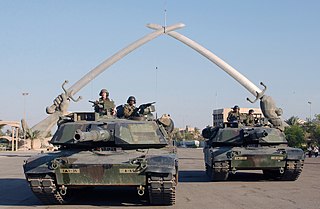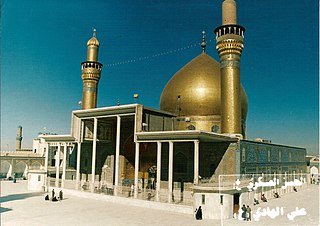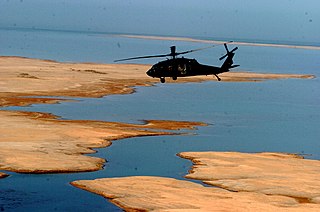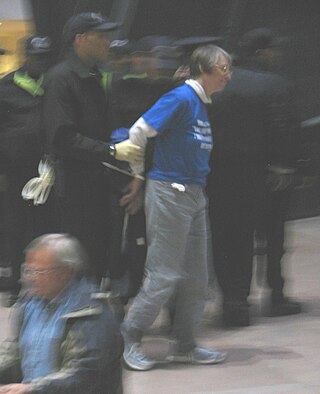Related Research Articles

Estimates of the casualties from the Iraq War have come in several forms, and those estimates of different types of Iraq War casualties vary greatly.

Karbala or Kerbala is a city in central Iraq, located about 100 km (62 mi) southwest of Baghdad, and a few miles east of Lake Milh, also known as Razzaza Lake. Karbala is the capital of Karbala Governorate, and has an estimated population of 691,100 people (2024).

The following is a timeline of major events during the Iraq War, following the 2003 invasion of Iraq.

The Mahdi Army was an Iraqi Shia militia created by Muqtada al-Sadr in June 2003 and disbanded in 2008.

The Lancet, one of the oldest scientific medical journals in the world, published two peer-reviewed studies on the effect of the 2003 invasion of Iraq and subsequent occupation on the Iraqi mortality rate. The first was published in 2004; the second in 2006. The studies estimate the number of excess deaths caused by the occupation, both direct and indirect.
The Imam Husayn Shrine is the mosque and burial site of Husayn ibn Ali, in the city of Karbala, Iraq. It stands on the site of the Mausoleum of Husayn, who was a grandson of Muhammad, near the place where he embraced martyrdom during the Battle of Karbala in 680 CE. The tomb of Husayn is one of the holiest sites in Shia Islam, outside of Mecca and Medina, and many make pilgrimages to the site. Every year, millions of pilgrims visit the city to observe Ashura, which marks the commemoration of Husayn's death for all Muslims.

The 2006 al-Askari Shrine bombing occurred on 22 February 2006 at approximately 6:44 a.m. local Iraqi time, and targeted the al-Askari Shrine in the city of Samarra, Iraq. The attack on the mosque, one of the holiest sites in Shia Islam, has not been claimed by any group; the then President of the United States, George W. Bush, claimed that the bombing was an al-Qaeda plot. Although the mosque was severely damaged from the blast, there were no casualties.

The Iraq War, sometimes called the Second Gulf War was a protracted armed conflict in Iraq from 2003 to 2011. It began with the invasion of Iraq by the United States-led coalition that overthrew the Ba'athist government of Saddam Hussein. The conflict continued for much of the next decade as an insurgency emerged to oppose the coalition forces and the post-invasion Iraqi government. US troops were officially withdrawn in 2011.
Events in the year 2007 in Iraq.

Operation Imposing Law, also known as Operation Law and Order, Operation Fardh al-Qanoon or Baghdad Security Plan (BSP), was a joint Coalition-Iraqi security plan conducted throughout Baghdad. Under the Surge plan developed in late 2006, Baghdad was to be divided into nine zones, with Iraqi and American soldiers working side by side to clear each sector of Shiite militias and Sunni insurgents and establish Joint Security Stations so that reconstruction programs could begin in safety. The U.S. military commander in Iraq, David Petraeus, went so far as to say Iraq would be "doomed" if this plan failed. Numerous members of Congress stated the plan was a critical period for the U.S. presence in Iraq.
On Friday, 14 September 2007, ORB International, an independent polling agency located in London, published estimates of the total war casualties in Iraq since the US-led invasion of Iraq in 2003. At over 1.2 million deaths (1,220,580), this estimate is the highest number published so far. From the poll margin of error of +/-2.5% ORB calculated a range of 733,158 to 1,446,063 deaths. The ORB estimate was performed by a random survey of 1,720 adults aged 18+, out of which 1,499 responded, in fifteen of the eighteen governorates within Iraq, between August 12 and August 19, 2007. In comparison, the 2006 Lancet survey suggested almost half this number through the end of June 2006. The Lancet authors calculated a range of 392,979 to 942,636 deaths.

Events in the year 2008 in Iraq.
On January 9, 2008 the World Health Organization reported the results of the "Iraq Family Health Survey" published in the New England Journal of Medicine. The study surveyed 9,345 households across Iraq and was carried out in 2006 and 2007. It estimated 151,000 deaths due to violence from March 2003 through June 2006.

March 19, 2008, being the fifth anniversary of the United States 2003 invasion of Iraq and in protest and demonstration in opposition to the war in Iraq, anti-war protests were held throughout the world including a series of autonomous actions in the United States' capitol, Washington, D.C., in London, Sydney, Australia, and the Scottish city of Glasgow with the latter three being organized by the UK-based Stop the War Coalition. Actions included demonstrations at government buildings and landmarks, protests at military installations and student-led street blockades. The protests were notable, in part, for mostly replacing mass marches with civil disobedience – including religious-focused protests – and for utilizing new technologies to both coordinate actions and interface with traditional print and broadcast media.

The Al-Abbas Shrine is the mausoleum of Abbas ibn Ali and a mosque, located near the Imam Husayn Mosque in Karbala, Iraq. Abbas was son of Ali ibn Abi Talib and the half-brother of Imam Hasan and Imam Husayn. He was Husayn's flag-bearer in the Battle of Karbala and chief of his caravans. The shrine is revered by the Shia Muslims who visit it every year, especially in the month of Muharram.

The Ministry of Health is the cabinet-level ministry of the Iraqi government tasked to provide health and medical services to every Iraqi citizen during normal and emergency circumstances in the country.
The Iraq War resulted in multiple humanitarian crises.

Sir Simon Charles Wessely is a British psychiatrist. He is Regius Professor of Psychiatry at the Institute of Psychiatry, King's College London and head of its department of psychological medicine, vice dean for academic psychiatry, teaching and training at the Institute of Psychiatry, as well as Director of the King's Centre for Military Health Research. He is also honorary consultant psychiatrist at King's College Hospital and the Maudsley Hospital, as well as civilian consultant advisor in psychiatry to the British Army. He was knighted in the 2013 New Year Honours for services to military healthcare and to psychological medicine. From 2014 to 2017, he was the elected president of the Royal College of Psychiatrists and then became the first psychiatrist to be elected as President of the Royal Society of Medicine in 200 years.
The Iraq War documents leak is the disclosure to WikiLeaks of 391,832 United States Army field reports, also called the Iraq War Logs, of the Iraq War from 2004 to 2009 and published on the Internet on 22 October 2010. The files record 66,081 civilian deaths out of 109,000 recorded deaths. The leak resulted in the Iraq Body Count (IBC) project adding 15,000 civilian deaths to their count, bringing their total to over 150,000, with roughly 80% of those civilians. It is the biggest leak in the military history of the United States, surpassing the Afghan War documents leak of 25 July 2010.
References
- ↑ SUNNI LEADERS CRITICIZE PARLIAMENT VOTE ON MINISTERS, Radio Free Europe , 2007-10-31, accessed on 2008-03-06
- ↑ Iraq Moves to Repeal Immunity for Guards, Washington Post , 2007-10-31, accessed on 2008-03-06
- ↑ The Military Health System Blog, Dr. Bruno Himmler, 2007-12-06, accessed on 2008-03-06
- ↑ Alkhuzai AH, Ahmad IJ, Hweel MJ, Ismail TW, et al. (2008). "Violence-Related Mortality in Iraq from 2002 to 2006" (PDF). New England Journal of Medicine . 358 (2): 484–93. doi:10.1056/NEJMsa0707782. PMID 18184950. S2CID 3186924. Archived from the original (PDF) on 2020-02-26. January 31, 2008. Supplementary Appendix provided by the authors:
- ↑ WHO country office in Iraq. Iraq Family Health Survey Archived 2008-06-11 at the Wayback Machine . World Health Organization (WHO).
- ↑ "New study says 151,000 Iraqi dead". January 10, 2008. BBC News Online.
- ↑ "151,000 civilians killed since Iraq invasion". By Sarah Boseley. January 10, 2008. The Guardian .
- ↑ "W.H.O. Says Iraq Civilian Death Toll Higher Than Cited". By Lawrence K. Altman and Richard A. Oppel Jr.. January 10, 2008. New York Times.
- ↑ "IRAQ: Civilian Deaths Massive by Any Measure" Archived 2008-12-06 at the Wayback Machine . By Haider Rizvi. January 11, 2008. Inter Press Service News Agency.
- ↑ "New study says 151,000 Iraqi dead". BBC News. January 10, 2008.
- ↑ "W.H.O. Says Iraq Civilian Death Toll Higher Than Cited" By Lawrence K. Altman and Richard A. Oppel Jr. January 10, 2008. The New York Times .
- ↑ "Saleh Al-Hasnawi: candidate for the post of Director-General of UNESCO". UNESCO.